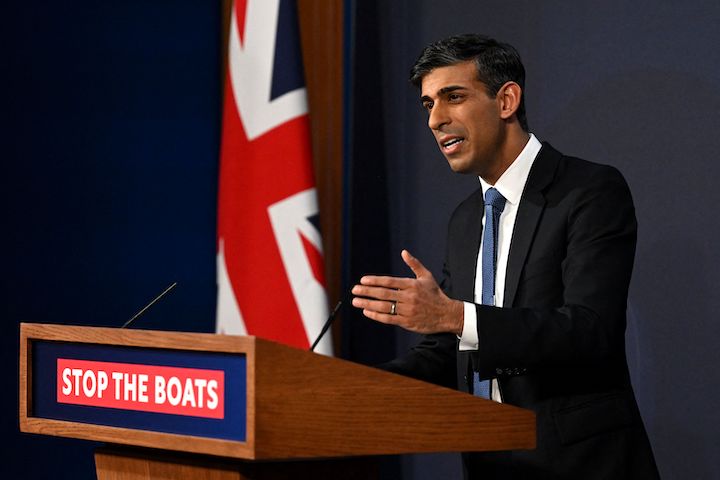In an ironic twist, cruise ships are being hailed as the latest measure to help ‘stop the boats’. Most Fleet Street newspapers have today splashed on briefings that Channel migrants will be housed on ex-military bases, disused ships and barges, under plans that are expected to be announced later today. The aim is twofold: to act as a deterrent for future migrants and to cut the £6 million-a-day hotel bill to house the 50,000 people who are already here.
The Times reports that ministers have procured an ‘accommodation barge’ capable of holding hundreds of migrants, which is being refitted. It will probably be moored in port rather than at sea, with the location yet to be decided. Former military bases include RAF Wethersfield in Essex and RAF Scampton in Lincolnshire. Sources close to Robert Jenrick, the immigration minister, are briefing that he hopes to start moving new arrivals to military sites within weeks.
Versions of this policy have been briefed out multiple times under the Sunak government
The use of military bases and cruise ships are controversial for different reasons. The former are often based in Tory constituencies and spark a visceral reaction from local residents who are not too enthusiastic at the prospect of housing thousands of young men. RAF Wethersfield is in James Cleverly’s seat of Braintree; he is understood to share local concerns. RAF Scampton, meanwhile, is the home of the Dambusters squadron, with Nigel Farage now championing a petition to stop it being turned into a 1,500-strong asylum centre.
What about cruise ships then? Rishi Sunak proposed putting migrants on such barges as early as last summer when he ran for the Tory leadership. But, as critics point out, similar policies have been floated for decades to host refugees and prisoners, without success. A previous effort was mounted in 1986 when the Thatcher government rented a ferry called the Earl Williams which almost ended in disaster when a storm dragged the boat out to sea from its mooring in an Essex port. Priti Patel was considering a similar scheme as recently as December 2020, using the Estonian-owned Silja Europa cruise ship to hold up to 3,000 passengers. That too came to nought. Versions of this policy have been briefed out multiple times under the Sunak government: in November and December last year, and again last month.
What then, has changed? Ministers are stressing that illegal mass migration is a Europe-wide problem, with attitudes hardening across the continent. At cabinet yesterday, it was pointed out that Greece, Germany, Belgium and the Netherlands are using large-scale sites to accommodate migrants. The Dutch government is using ships to house migrants, while Nicola Sturgeon’s administration deployed disused cruise ships for Ukrainian refugees. It is therefore hoped that such arrangements would not breach international conventions on refugees.
The Times story on the accommodation barge noted that discussions are at an ‘early stage’, which suggests that the proposal to transfer migrants to former military bases will feature more prominently in today’s announcements. But local authorities in such areas will bitterly fight the government in such areas – with those in Essex and Lincolnshire expected to seek High Court injunctions.
The problems involved with both land and port sites highlights once again why Sunak’s promise to ‘stop the boats’ is likely to be the most difficult of his five pledges to fulfil.







Comments